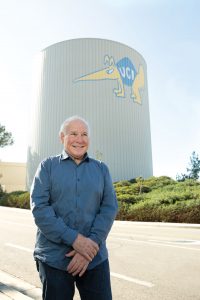
David Feldman, director of Water UCI and professor of urban planning and public policy and political science, discusses UC Irvine’s interdisciplinary approach to helping solve the world’s biggest water issues.
What is Water UCI?
We started about eight years ago as an initiative on the part of the chancellor to bring different units of the university together to explore issues of societal importance. Some colleagues and I got together and said, “A really important issue here is water.” If you took Irvine and drew a circle out 100 miles, which includes the ocean, you would encounter just about every water problem faced on the planet, from too little water to too much water. In addition to finding every water problem conceivable, we believe you can also find solutions to those problems if you can bring folks together.
We were funded by the chancellor for three years and then we became self-supporting, which means we found agencies, foundations, and clients to fund our work in research, education, and outreach.
Let’s start with outreach.
A main component involves having seminars on various subjects related to water problems. We invite experts from the university and from around the world to give (talks) on topics of water such as drought, contaminants of emerging concern, and community solutions to water injustice. It’s free and open to the general public, and the experts speak in plain language. We also netcast the talks.
What about education?
We have a field study program in the school of social ecology where we hire undergraduate students to work on our projects and get exposed to real-world problem-solving. We’re also developing a continuing education program that we hope to launch this year, an opportunity for water professionals to learn more about leadership. A third program is working with middle schools in central O.C. on water-conservation issues.
And research?
Areas of research we’re working on include contaminants of emerging concern such as PFAS, water diplomacy and disputes, and the security of virtual platforms water agencies are using to store and share data. We also just finished a project for the governor’s Natural Resources Cabinet. In 2020, they came out with the California Water Resilience Portfolio. Basically, the cabinet solicited opinions from literally hundreds of people around the state about the major challenges with water. We were approached by the cabinet to take this information and unpack it to find out exactly what are the scientific problems that need to be addressed right now. We did a statewide survey and held a virtual workshop, and we concluded that one of the biggest concerns that Californians have about the future of water, in the face of great demands and great uncertainties, is: How can we make sure we have a water supply that’s not only available but equitably and fairly managed? We’re going to propose exploring in greater detail the innovations that are being promoted—desalination, conservation, rainwater harvesting. We’d like to help the state figure out how these innovations can be implemented keeping in mind public acceptance and fairness.
What is meant by “water justice”?
If you look at the management of water in California and elsewhere, underrepresented populations—people of color, minority groups, lower-income residents, the homeless population—generally are more subject to water hazards than are the rest of the population. How so? In California, those groups tend to live in areas where water supplies are of questionable quality, and they can’t afford water as the price goes up due to climate change. Water justice means making sure whatever decision we make about the future of the water supply takes their opinions, well-being, and considerations into account.
Water is one of the very top issues in our region and in our world. There’s a big debate about water rights—is there a human right to water? I take a different tack. There’s one fact that’s inarguable: Water is a human NEED. None of us can survive without it. And between climate change and growing demands, we are facing some serious challenges on how we can manage water efficiently and equitably. When I look around the world and see problems of poverty and childhood diseases and public health, the common denominator is water. Water is a cause. Water is a symptom. Water is a consequence of all of these problems.
Why is Water UCI positioned to help address these problems?
I think our center is really blessed by the fact that we have a lot of support from the Orange County and regional water community. Virtually every institution knows of us and works with us. There is a unique base of support in this region for partnership between the water sector and universities. These agencies are far-sighted. They are looking to tomorrow’s problems.
